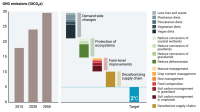Food was for the first-time part of the agenda at COP27
It is becoming increasingly clear that we need to transform our food system. For several years, global food security was improving, but it is no longer the case, as more people in the world are starving, while rates of obesity are rising. At the same time emissions from the global food system are also rising, and unless drastic changes are taken, global emissions will by 2050 have increased by 60-90% compared to 2010 levels.
In addition, biodiversity is also under severe pressure - all reflecting a food system that is not in balance. For the first time, a theme day was dedicated to agriculture at the COP and food security was mentioned in the official COP decision - the Sharm el-Sheikh Implementation Plan.
According to the 2022 Emissions Gap Report from the UN Environmental Program (UNEP), transforming the food system requires a combination of actions in four different domains, see figure below:
- Changes in food demand, like reduced food loss and waste and more plant-rich diets
- Ecosystem protection, like protection and restoration of peatlands and forest
- Farm-level improvements, like improving the feed conversion ratio
- Decarbonization of value chains, like reducing emissions from transport and energy

Projections of emissions in the food system and illustrations of reduction potentials. Source UNEP, 2022.
Several policy initiatives were launched, and private companies, organizations and public actors put forward research, tools, concepts, approaches, regulations, and new products, all to push and help transform the food system. Many different solutions need to be brought to the table, as the transformation pathways will vary from region to region. A systematic approach to transforming our food production is needed, but two movements are going in somehow different directions.
One is about the further development and improvement of industrialized agriculture, where big companies invest in large-scale production of greener solutions, such as alternative proteins. The other movement strives to be less resource-intensive and consist of small and medium size farmers supporting jobs in rural areas and local food production.
Based on the UN report, an unambiguous conclusion cannot be made on whether one or the other movement is 'right'. It is important to avoid betting the whole transition on one model, but it is essential that all solutions contribute to at least one of the four domains outlined by the UNEP report.
Several concrete initiatives were presented at COP27 and are relevant for food system transformation, here are just a few:
- In the final COP decision paper- the ’Sharm el-Sheikh Implementation Plan’, food was mentioned primarily in relation to the ongoing food crises, which was acknowledged as a fundamental priority.
- Also the “Koronivia Joint Work on Agriculture’' was referred to in the COP decision paper, as decisions were taken to support the implementation of climate action in agriculture and ensure food security, by establishing ’the Sharm el-Sheikh online portal’ where parties and other actors can upload relevant experiences related to food and agriculture.
- Food and Agriculture for Sustainable Transformation (FAST) is an initiative that strives to accelerate transformation in the food sector and increase climate finance for agriculture and food systems to support vulnerable communities.
- I-CAN is an initiative which will support collaboration to accelerate transformative action that addresses the links between climate change and nutritions.
CONCITO had the pleasure of opening the Nordic Council of Ministers' Food System Transformation day with a presentation of key points from UNEP's Emissions Gap Report 2022 as well as a presentation of the Big Climate Database as a concrete tool that contributes to promoting food consumption with smaller carbon footprint.
It is positive that food production and consumption is higher on the COP agenda. It is crucial that actions cover the four UNEP domains mentioned above, and also take into account the potentials and barriers of different regions in the transition. But the challenges were far from resolved at COP27, as they are huge and there is a general lack of focus on reducing emissions from agriculture. The transformation of the food system should be much more integrated into countries' national climate plans, the so-called NDCs, and include both mitigation of emissions from agriculture and increasing the resilience of food production to avoid negative impact posed by climate change.
Fortunately, the transition does not wait for the COP, and it is crucial that all actors at all levels, from global to local, are involved in bringing about the necessary transformation in the food system everywhere. It will be a huge challenge to provide a growing world population with nutritious, healthy and tasty food while reducing our climate impact and enhancing global biodiversity.
Picture taken by UNclimatechange.





